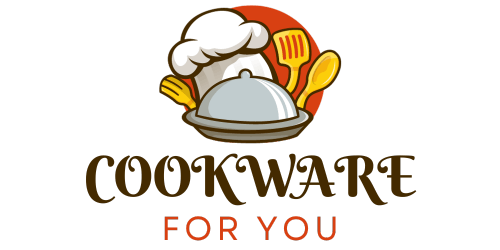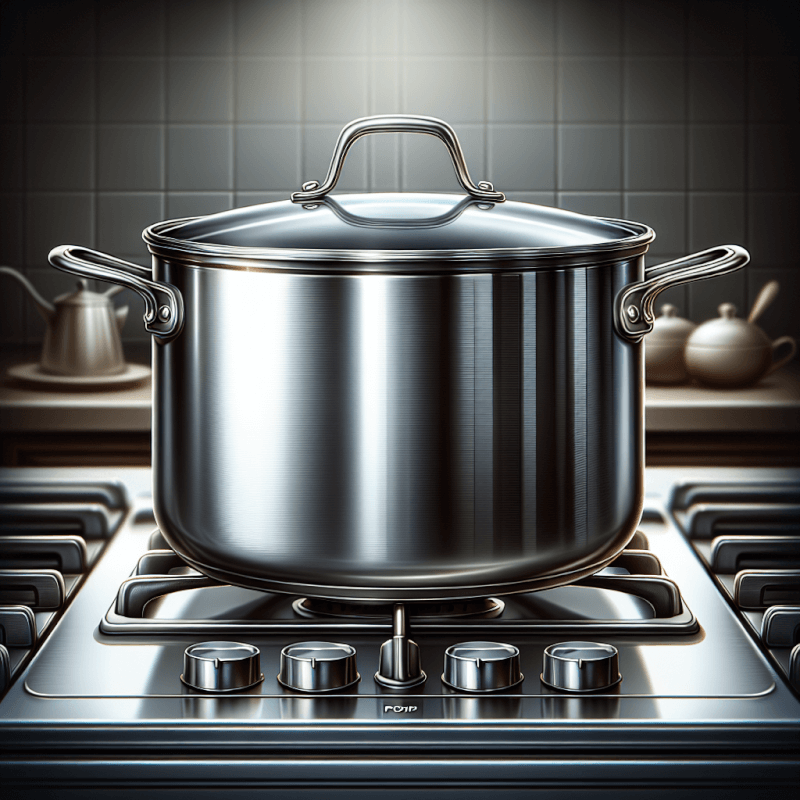Planning to cook for a large gathering but unsure about the right cookware? Fret not, as this article has got you covered! Choosing cookware that can handle the demands of cooking for a big group can be daunting, but with the right guidance, it can be a breeze. From considering the size of the cookware to the material it is made of, we will explore all the essential factors to help you select the perfect cookware for your large gatherings. So, let’s dive in and ensure you have everything you need to create delicious meals that will impress your guests!
Material
Nonstick
When it comes to cookware materials, nonstick options are a popular choice. Nonstick cookware is coated with a nonstick surface, typically made of polytetrafluoroethylene (PTFE), which prevents food from sticking to the pan. This makes it easier to cook delicate foods like eggs or fish without them tearing or breaking apart. Nonstick cookware is also generally easier to clean since food particles are less likely to adhere to the surface. However, it’s important to note that nonstick coatings can wear off over time and may not be suitable for high-heat cooking methods or use with metal utensils.
Stainless Steel
Stainless steel cookware is known for its durability and resistance to rust and corrosion. It is a versatile material that can be used for various cooking methods, including searing, sautéing, and boiling. Stainless steel cookware is also typically dishwasher safe and easy to clean. One key consideration when choosing stainless steel cookware is the construction. Cookware with a thick, multi-layered base or a conductive aluminum or copper core will ensure better heat distribution and prevent hot spots.
Cast Iron
Cast iron cookware has been used for centuries and is known for its excellent heat retention properties. It can evenly distribute heat and maintain high temperatures, making it ideal for dishes that require long, slow cooking. Cast iron cookware is also incredibly durable and can withstand high heat and heavy use. However, cast iron can be quite heavy and requires proper maintenance to prevent rusting. It’s important to season cast iron cookware regularly to create a nonstick surface and to clean it properly to prevent the flavors from previous meals from transferring to future dishes.
Copper
Copper cookware is prized for its exceptional heat conductivity. It heats up quickly and distributes heat evenly, allowing for precise temperature control. Copper cookware is often lined with another metal, such as stainless steel or tin, to prevent any reaction between acidic foods and the copper itself. This lining also makes maintenance easier, as copper can tarnish and require regular polishing. Copper cookware is a popular choice among professional chefs but can be quite expensive.
Aluminum
Aluminum cookware is known for its excellent heat conductivity, similar to copper. It heats up quickly and spreads heat evenly across the surface. Aluminum cookware is also lightweight, making it easy to handle and maneuver. However, pure aluminum cookware can react with acidic or alkaline foods, so it’s often coated with a nonstick or stainless steel layer to prevent any interaction. It’s important to note that aluminum cookware may not be suitable for induction cooktops unless it has a magnetic base.
Size and Capacity
Consider the number of guests
When cooking for large gatherings, it’s important to consider the number of guests you’ll be serving. This will help you determine the sizes and quantities of cookware you’ll need. If you frequently entertain large groups, investing in larger pots and pans will ensure you have enough capacity to prepare meals efficiently.
Assess the volume of food
In addition to the number of guests, it’s also important to assess the volume of food you’ll be cooking. Are you preparing a single dish or multiple dishes? Do you need larger pots for boiling pasta or soups? Considering the volume of food will help you determine the appropriate sizes of pots and pans.
Look for extra-large options
If you often find yourself cooking for exceptionally large gatherings, it may be worth considering extra-large cookware options. Some manufacturers offer oversized stockpots and roasting pans specifically designed for cooking in larger quantities. These extra-large options can save you time and effort when preparing meals for a crowd.
Number of Pieces
Assess the variety of dishes
When choosing cookware for large gatherings, it’s important to assess the variety of dishes you’ll be preparing. Different dishes may require specific types of cookware, such as saucepans for making sauces or frying pans for searing meats. Having a diverse set of cookware pieces will allow you to easily prepare a range of dishes without having to improvise or compromise on quality.
Consider specialized items
In addition to standard pots and pans, consider whether you’ll need any specialized cookware items for specific dishes. For example, if you frequently make casseroles or baked goods, investing in a casserole dish or baking sheet can be beneficial. Specialized items can help you achieve better results in your cooking and add versatility to your kitchen arsenal.
Opt for sets with multiple sizes
To ensure you have enough cookware for large gatherings, opt for sets that offer multiple sizes of pots and pans. Having different-sized options will give you flexibility in preparing different dishes and allow you to adjust the quantities as needed. Look for sets that include a variety of sizes to accommodate both small and large meals.
Lids and Handles
Ensure sturdy and heat-resistant handles
When choosing cookware for large gatherings, it’s important to ensure that the handles are sturdy and heat resistant. This is especially crucial when working with larger and heavier pots and pans that may be full of hot food. Ergonomic handles that provide a comfortable grip will make it easier and safer to maneuver the cookware, even when it’s at high temperatures.
Opt for clear glass or metal lids
Having lids that fit well and seal tightly is essential for cooking large quantities of food. Clear glass or metal lids allow you to monitor the cooking process without having to remove the lid and release heat. Glass lids also have the advantage of being able to withstand high temperatures and can be used in the oven, while metal lids may be more durable and resistant to breakage.
Heat Conductivity
Choose cookware with excellent heat distribution
Proper heat distribution is crucial when cooking for large gatherings. Uneven heat distribution can result in some areas of the food being undercooked or burnt. Choosing cookware with excellent heat distribution properties will help ensure that the heat is evenly distributed across the entire cooking surface.
Look for copper or aluminum cores
Cookware with copper or aluminum cores is known for its excellent heat conductivity. These metals can quickly and evenly distribute heat, reducing the chances of hot spots and ensuring that the food cooks evenly. When shopping for cookware, look for options that have a copper or aluminum core in the base or throughout the entire cookware piece.
Versatility
Consider multipurpose cookware
When cooking for large gatherings, it’s helpful to have multipurpose cookware that can perform a variety of cooking tasks. For example, a Dutch oven can be used for braising, soups, stews, and even baking bread. Having versatile cookware eliminates the need for multiple pieces and simplifies meal preparation.
Look for items with compatibility
Another factor to consider when choosing cookware for large gatherings is compatibility with your existing kitchen appliances. If you have an induction cooktop, ensure that the cookware is compatible with induction heating. Similarly, if you plan to use the cookware in the oven, make sure it is oven-safe. Having compatible cookware will allow you to seamlessly move between different cooking methods.
Choose pieces suitable for various cooking methods
Cooking for large gatherings often involves a range of cooking methods, from sautéing and frying to boiling and simmering. Choose cookware pieces that are suitable for various cooking methods to accommodate the different dishes you’ll be preparing. For example, a skillet or sauté pan is great for stovetop cooking, while a stockpot is ideal for boiling pasta or making large batches of soup.
Durability and Longevity
Check for solid construction
Durability is an important consideration for cookware, especially when cooking for large gatherings. Look for cookware that is made with high-quality materials and has a solid construction. Reinforced handles, sturdy rivets, and thick bases are indicators of a well-made cookware piece that can withstand heavy use without warping or denting.
Consider warranty and customer reviews
Before making a purchase, consider checking the manufacturer’s warranty and reading customer reviews. A warranty can provide peace of mind knowing that the manufacturer stands behind their product. Customer reviews can offer insights into the durability and longevity of the cookware based on real experiences. Taking the time to research and consider these factors will help you choose cookware that will last for years to come.
Non-Toxic and Safe
Opt for PFOA-free nonstick coatings
If you opt for nonstick cookware, it’s important to choose options that are free from perfluorooctanoic acid (PFOA). PFOA is a potentially harmful chemical commonly used in nonstick coatings, and its ingestion or inhalation can have adverse health effects. Look for cookware labeled as PFOA-free to ensure that the nonstick coating is safe for you and your guests.
Choose stainless steel or cast iron for chemical-free options
For those concerned about potentially harmful chemicals in nonstick coatings, stainless steel and cast iron are excellent alternatives. These materials do not require any additional coatings and are naturally non-toxic. Stainless steel is known for its durability and resistance to rust, while cast iron provides excellent heat retention and versatility.
Cleaning and Maintenance
Consider dishwasher-safe options
When choosing cookware for large gatherings, it’s important to consider the cleaning and maintenance involved. Look for cookware that is dishwasher safe to make cleanup easier and more convenient, particularly when dealing with larger pots and pans. However, keep in mind that some cookware may require handwashing to maintain optimal performance and prolong its lifespan.
Ensure easy-to-clean surfaces
Cooking for large gatherings can often result in stubborn food residues and stains. To make cleaning easier, choose cookware with surfaces that are easy to clean. Nonstick surfaces, for example, are less likely to have food particles stick to them, making cleanup a breeze. Stainless steel surfaces are also relatively easy to clean, although they may require some scrubbing for tougher stains.
Follow manufacturer’s instructions
To ensure that your cookware stays in good condition, it’s important to follow the manufacturer’s instructions for cleaning and maintenance. Each cookware piece may have specific care requirements, such as avoiding abrasive cleaning agents or using a specific cleaning method. By following these instructions, you can keep your cookware in optimal condition for years to come.
Budget and Value for Money
Set a budget
Before embarking on your cookware shopping journey, it’s important to set a budget. Cookware can vary greatly in price, and having a budget in mind will help narrow down your options and prevent overspending. Consider how often you cook for large gatherings and how much you’re willing to invest in quality cookware.
Consider long-term investment
While it can be tempting to opt for budget-friendly cookware, it’s important to consider the long-term investment. Cheaper cookware may need to be replaced more frequently, resulting in additional costs in the long run. Investing in higher-quality cookware may be a more cost-effective choice, as it will last longer and perform better over time.
Look for discounts and deals
To get the best value for your money, keep an eye out for discounts and deals on cookware. Many retailers offer promotions or sales throughout the year, so take advantage of these opportunities to find high-quality cookware at a more affordable price. Additionally, consider shopping during seasonal sales, such as Black Friday or Cyber Monday, when cookware deals are often available.





